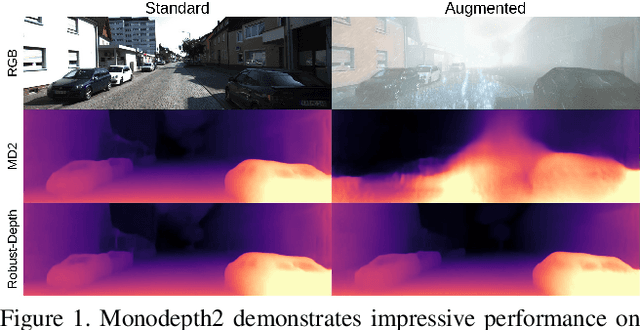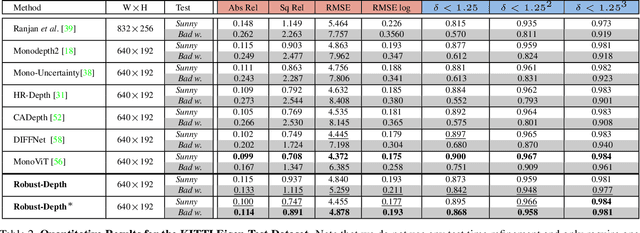Luis Manso
Self-supervised Monocular Depth Estimation: Let's Talk About The Weather
Jul 17, 2023



Abstract:Current, self-supervised depth estimation architectures rely on clear and sunny weather scenes to train deep neural networks. However, in many locations, this assumption is too strong. For example in the UK (2021), 149 days consisted of rain. For these architectures to be effective in real-world applications, we must create models that can generalise to all weather conditions, times of the day and image qualities. Using a combination of computer graphics and generative models, one can augment existing sunny-weather data in a variety of ways that simulate adverse weather effects. While it is tempting to use such data augmentations for self-supervised depth, in the past this was shown to degrade performance instead of improving it. In this paper, we put forward a method that uses augmentations to remedy this problem. By exploiting the correspondence between unaugmented and augmented data we introduce a pseudo-supervised loss for both depth and pose estimation. This brings back some of the benefits of supervised learning while still not requiring any labels. We also make a series of practical recommendations which collectively offer a reliable, efficient framework for weather-related augmentation of self-supervised depth from monocular video. We present extensive testing to show that our method, Robust-Depth, achieves SotA performance on the KITTI dataset while significantly surpassing SotA on challenging, adverse condition data such as DrivingStereo, Foggy CityScape and NuScenes-Night. The project website can be found here https://kieran514.github.io/Robust-Depth-Project/.
SocNavGym: A Reinforcement Learning Gym for Social Navigation
Apr 27, 2023



Abstract:It is essential for autonomous robots to be socially compliant while navigating in human-populated environments. Machine Learning and, especially, Deep Reinforcement Learning have recently gained considerable traction in the field of Social Navigation. This can be partially attributed to the resulting policies not being bound by human limitations in terms of code complexity or the number of variables that are handled. Unfortunately, the lack of safety guarantees and the large data requirements by DRL algorithms make learning in the real world unfeasible. To bridge this gap, simulation environments are frequently used. We propose SocNavGym, an advanced simulation environment for social navigation that can generate a wide variety of social navigation scenarios and facilitates the development of intelligent social agents. SocNavGym is light-weight, fast, easy-to-use, and can be effortlessly configured to generate different types of social navigation scenarios. It can also be configured to work with different hand-crafted and data-driven social reward signals and to yield a variety of evaluation metrics to benchmark agents' performance. Further, we also provide a case study where a Dueling-DQN agent is trained to learn social-navigation policies using SocNavGym. The results provides evidence that SocNavGym can be used to train an agent from scratch to navigate in simple as well as complex social scenarios. Our experiments also show that the agents trained using the data-driven reward function displays more advanced social compliance in comparison to the heuristic-based reward function.
 Add to Chrome
Add to Chrome Add to Firefox
Add to Firefox Add to Edge
Add to Edge